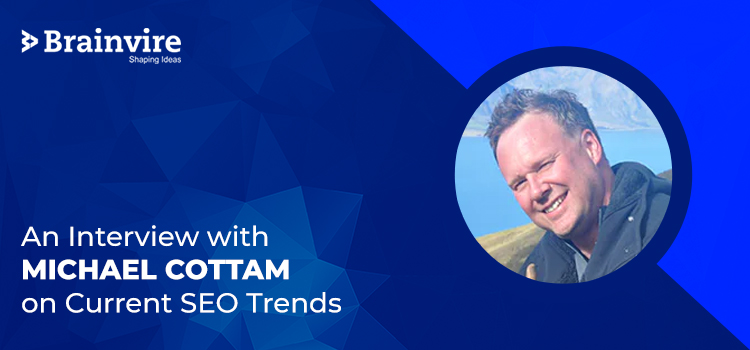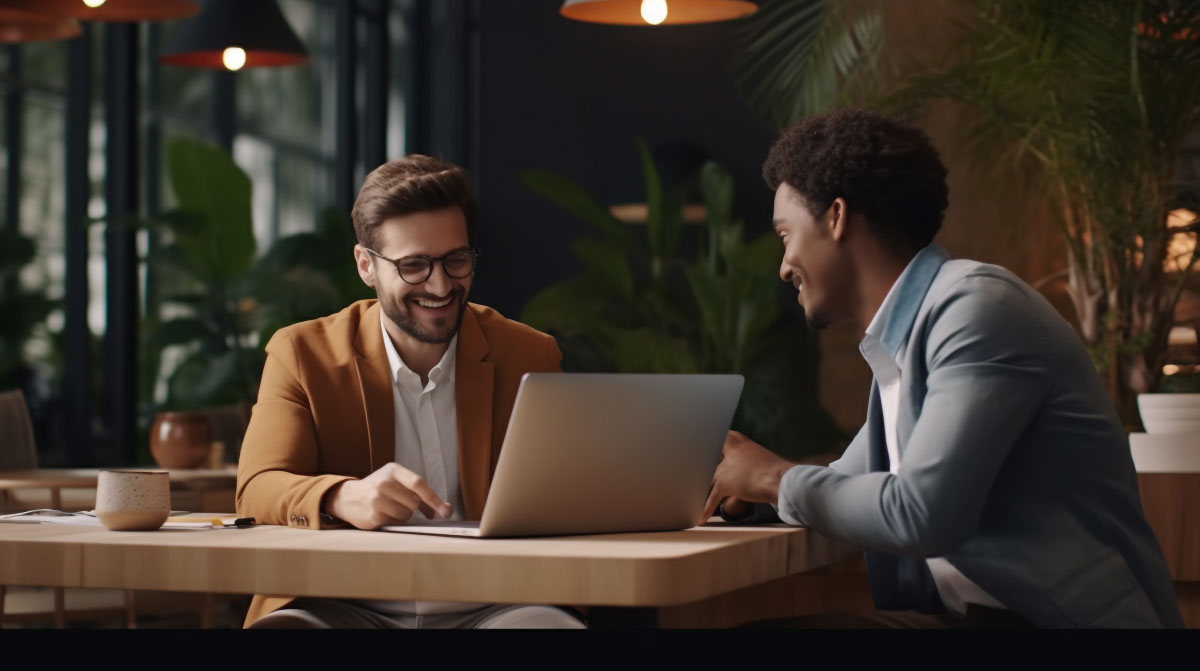Michael Cottam, a member of Moz and the ultimate authority in technical SEO, shared his SEO secrets, industry trends, and rules of online success with Brainvire. This exclusive interview series encompasses the online marketing industry’s greatest leaders, including Michael. He brings to the table skills not only in SEO but also in business management.

1. How Does Video Marketing be Useful to Maximize Your Reach and Sales?
From a new organic traffic perspective, you can use YouTube to get exposure to new prospective clients by creating “how-to” type videos that answer common questions your clients might have. A company that does this really well is Repairclinic.com, which sells appliance parts, and offers a ton of videos on how to replace or repair specific problems with household appliances.
As well, you can show Google that your website’s pages are better “answers” to specific searches by embedding videos that answer those questions in the pages and adding schema.org/VideoObject markup to tell Google what those videos are about. If you’re selling bird feeders, for example, if Google can tell your page has a video about bird feeders on it, then that makes that likely to be a better and/or more interesting page about bird feeders than a competitor’s page if everything else (text, image content, links, etc.) is equal. And, if the video really IS interesting, and a good percentage of visitors to the page watch the video, that can increase the average time on the page, which is a positive signal to Google about whether that page is helpful to users.
2. Does CMS Platforms Effect On SEO Campaigns?
For the most part, it doesn’t. Some of the really simple, restrictive platforms like Wix and Weebly can block you from doing some of the custom SEO things you might want to do, however. Shopify, while generally good at SEO out of the box, has an overly restrictive robots.txt file that you cannot fix that essentially throws away link juice to any page that has multiple parameters in the URL. Magento used to have issues with creating a myriad of variations on a given page (with different URLs) based on faceted search parameters, but these days they’re able to easily solve that with rel canonicals. WordPress is a good solid platform for many businesses, especially with the Yoast SEO plugin installed.
3. Reasons why PPC and SEO are better together?
Some studies have shown a mild increase in click-through rates on your organic listings if the search results page also shows a paid ad for your site as well.
4. How do you see the June 2019 Core update?
Really, there’s little information from Google about what actually changed. Various studies have shown losses by weak news sites, and gains by trusted news brands. I take that as a signal that Google simply expanded their ability to measure the E-A-T factors (expertise, authority, and trust).
5. What do you think are the three deadly SEO mistakes that affect the website ranking?
Negative SEO is #1. An enormous percentage of sites I look at these days have been impacted by negative SEO. The main perpetrator of negative SEO appears to host all their sites at Cloudflare, and they’ve built link farms of thousands of penalized subdomains, and have clearly automated the process of building thousands of links quickly from their penalized sites.
Not paying enough attention to page load times is #2. Not only are slow load times impacting rankings, but they also impact abandonment rates, so even if you do rank for a given term, many users who have clicked through to your site are giving up because the pages take too long to load.
Failure to implement (and test!) your schema.org markup #3. Schema markup is an important indicator to Google not just of what’s on the page, but also who created the content (and are they a real person, are they at all notable, etc.), and what organization owns the website (and that organization’s footprint across the web). This is important information for Google to consider when evaluating the E-A-T for a page or a site.
6. Your tips for early startups for their marketing activities?
#1 Facebook is a relatively inexpensive way to get exposure for your brand and your products, compared to Google PPC ads.
#2 When creating & promoting content, choose quality over quantity. You’re better off creating 1 new blog post each quarter and making it fascinating/noteworthy/etc. and then spending time on outreach promoting it to people who might reshare or link to it, rather than spending that same time creating 2 posts a week that nobody sees or cares about.
#3 Let your people and their personalities shine through. A business partner of mine has a favorite saying: “people do business with people they like”, and it’s true. Let your website show that your people are interesting, smart, diverse, quirky, and HUMAN.
7. What are your favorite SEO tools and why?
For backlinks analysis: LinkRisk from Kerboo – best overall identification of spammy sites of all the tools I’ve seen.
For keyword research: Moz Keyword Explorer – most realistic interpretation of Google Adwords Keyword API’s nutty search volume numbers, but also generate tremendously useful related terms to consider.
For crawling: Screaming Frog. Fast, reliable, covers all the crawl test stuff you need to look at.
For competitive analysis: Moz Pro Toolbar and the SERP overlay feature. It gives you a competitive landscape in terms of links, domain authority, page authority, etc. at a glance, woven into the Google search results.
8. What are the top game-changing SEO trends to follow in 2020?
Google’s focus on E-A-T is likely to increase further. It’s working well for them so far, pushing down non-authoritative sites and surfacing ones where the organization and/or author really do have credentials. But I expect them to refine it substantially in 2020.
Schema.org markup will become even more important, especially with respect to E-A-T.
Google’s continued expansion in terms of what they offer directly in the SERPs, taking clicks away from other websites. Whether it’s shopping, travel, general info like weather, time, what-is type information, they don’t seem to be slowing down at all here.
9. What are the three advanced link building strategies we need to follow in 2020?
#1 Build on your network of peers in your industry and work on substantial guest blog posts by experts (NOT outsourced guest posting!). You not only want to get your company’s experts published on other sites in your industry, but you also want experts from OTHER companies to be writing on your own blog. With all of these, you’ll want to be sure to mark up the author of the post with schema so that Google can see that (a) your people are experts who write for other sites in your industry, and (b) your own site has content from other experts in the industry.
#2 Leverage the combination of your expertise with market data (whether it’s your data, or you get it elsewhere). If you’re a bankruptcy attorney, perhaps you can create an article about trends in bankruptcies in your state vs. other states and tie that to what’s happening with international trade tariffs. If you’re a realtor, perhaps you can create an article on a shift in the market for vacation homes in 10 key areas of the country. If you’re a web development company, perhaps you can create an article on how some currently trendy design themes are actually hurting SEO because of page load times, Google not seeing content, etc. If you’re a dentist, perhaps you create an article on cities that have adopted fluoridated water in the past 10 years and the changes in those cities in cavity rates. Even if you’re a local business, be national in your article & data, so that many more sites will be interested in linking to/sharing your findings.
#3 This is really a link profile improvement strategy, not a link-building strategy: regularly review your backlinks (as seen in Google Search Console—we only care about what Google sees) and disavow the garbage that accumulates. Some of it is going to be just junk scraper sites that EVENTUALLY Google will ignore—but you should disavow it before your competitors do so that Google sees your competitors’ profiles as more spammy in the meantime. Some of it might be negative SEO, and while Google ignores a lot of it, they certainly don’t ignore it all. Some of it is just going to be super-weak legit sites, like BlogSpot or Wordpress.com blogs, and if your backlink profile happens to be heavily biased towards the weak end of the domain authority spectrum, that could be a big negative signal to Google in terms of your trustworthiness.
10. Your Top 3 Rules for Success
#1 The more you can do to make it clear to Google what your page is about, who created the content on the page, where your company has a presence on other sites and in other organizations, the better. Most of the time you do this through schema.org markup.
#2 Page speed is critical today – not just for Google rankings, but also for conversion. Many studies show a dramatic dropoff in conversions for every additional second of page load time, simply because users will give up before completing their task if your page is too slow.
#3 Don’t rely exclusively on tools to monitor your rankings. On a regular basis, do a handful of good representative keyword searches and see what Google is showing on page one: which competitors, what KINDS of results (video, image, news, shopping, ads, local, People Also Ask, Answer Boxes, Knowledge Graph, etc.), and what your prospective client is going to see about your page and your competitors’ pages on that first page of results: titles, meta descriptions, and rich snippets. There’s no substitute for seeing the search results exactly as your users are seeing them.
Conclusion:
Michael’s industry insights and experience in SEO will immensely benefit Brainvire as a digital marketing agency. Thus, Brainvire thanks Michael for providing his valuable time for this interview series.
Related Articles
-
An Exclusive Interview with Matt Diggity Reveals an Effective SEO Strategy For Any Business
Matt Diggity is the founder of Diggity Marketing, The Search Initiative, Leadspring, Authority Builders, and the Chiang Mai SEO conference. He is an SEO expert, influencer, blogger, and conference keynote
-
John Doherty’s Exclusive Interview With Brainvire Uncovers Powerful SEO Secrets
John Doherty is the founder of Credo, which is a service that connects businesses with the right marketing provider to help them grow. He is an international speaker and a
-
An Exclusive Interview With Ben Sailer Reveals Significant SEO Insights
Ben Sailer is the Inbound Marketing Director of CoSchedule. CoSchedule offers marketers a smart tool to manage content seamlessly. He is proficient in the field of content marketing and creates



